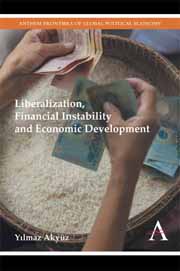Book contents
- Frontmatter
- Dedication
- Contents
- Introduction
- PART ONE LIBERALIZATION, STABILITY AND GROWTH
- Chapter I Financial Liberalization: The Key Issues
- Chapter II Managing Financial Instability in Emerging Markets: A Keynesian Perspective
- Chapter III From Liberalization to Investment and Jobs: Lost in Translation
- Chapter IV Exchange Rate Management, Growth and Stability: National and Regional Policy Options in Asia
- Chapter V Reforming the IMF: Back to the Drawing Board
- PART TWO THE GLOBAL ECONOMIC CRISIS AND DEVELOPING COUNTRIES
Chapter V - Reforming the IMF: Back to the Drawing Board
from PART ONE - LIBERALIZATION, STABILITY AND GROWTH
- Frontmatter
- Dedication
- Contents
- Introduction
- PART ONE LIBERALIZATION, STABILITY AND GROWTH
- Chapter I Financial Liberalization: The Key Issues
- Chapter II Managing Financial Instability in Emerging Markets: A Keynesian Perspective
- Chapter III From Liberalization to Investment and Jobs: Lost in Translation
- Chapter IV Exchange Rate Management, Growth and Stability: National and Regional Policy Options in Asia
- Chapter V Reforming the IMF: Back to the Drawing Board
- PART TWO THE GLOBAL ECONOMIC CRISIS AND DEVELOPING COUNTRIES
Summary
Introduction
The best reformers the world has ever seen are those who commence on themselves.
George Bernard ShawThere have been widespread misgivings about international economic cooperation in recent years even as the need for global collective action has grown because of recurrent financial crises in emerging markets, the increased gap between the rich and the poor, and the persistence of extreme poverty in many countries in the developing world. Perhaps more than any other international organization the International Monetary Fund (IMF) has been the focus of these misgivings.
Several observers including former treasury secretaries of the United States, a Nobel Prize-winning economist and many NGOs have called for its abolition on the grounds that it is no longer needed, or that its interventions in emerging market crises are not only wasteful but also harmful for international economic stability, or that its programs in the Third World serve to aggravate rather than alleviate poverty. Others want the IMF to be merged into the World Bank because they see them as doing pretty much the same thing with the same clientele.
Many who still wish to keep the IMF as an independent institution with a distinct mission call for reform of both what it has been doing and how it has been doing it. All these groups include individuals across a wide spectrum of political opinion, ranging from conservative free marketers to antiglobalisers.
- Type
- Chapter
- Information
- Liberalization, Financial Instability and Economic Development , pp. 183 - 220Publisher: Anthem PressPrint publication year: 2014



